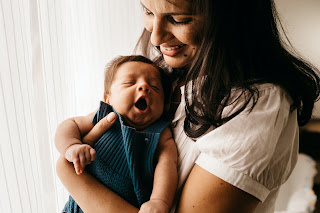Welcoming a new life into the world is a beautiful experience, but for many new mothers, it comes with unexpected changes, including postpartum hair fall. Hormonal fluctuations, stress, and nutritional changes can contribute to this common issue. Here's a guide to help you tackle postpartum hair fall and embrace your journey into motherhood.
1. Understand the Hormonal Shifts
Postpartum hair fall is often triggered by hormonal changes, especially the drop in estrogen levels after childbirth. Understanding this natural process can provide reassurance and perspective. Hair loss is typically temporary and should stabilize over time.
2. Maintain a Balanced Diet
A nutrient-rich diet is crucial for both your health and hair. Include foods rich in vitamins and minerals, such as iron, zinc, biotin, and omega-3 fatty acids. Incorporate leafy greens, nuts, seeds, and fish to support hair growth and overall well-being.
3. Stay Hydrated
Adequate hydration is essential for maintaining healthy hair. Drinking enough water supports the body's natural functions, including hair growth. Make hydration a priority in your postpartum routine.
4. Gentle Hair Care Routine
Opt for a mild shampoo and conditioner to avoid unnecessary stress on your hair. Be gentle while washing and combing, as postpartum hair may be more delicate. Use a wide-toothed comb to minimize breakage.
5. Avoid Heat Styling
Take a break from heat styling tools like hairdryers and straighteners. Excessive heat can weaken hair shafts, leading to increased fragility. Opt for air drying and natural hairstyles
6. Manage Stress Levels
Motherhood can be overwhelming, and stress can exacerbate postpartum hair fall. Practice stress management techniques such as deep breathing, meditation, or gentle exercises like yoga to promote relaxation.
7. Postpartum Vitamins and Supplements
Consult your doctor about postpartum vitamins or supplements that may support hair health. Biotin supplements are often recommended, but it's important to seek professional advice before starting any new regimen.
8. Professional Advice
If hair fall persists or intensifies, consult a healthcare professional or dermatologist. They can assess your specific situation, rule out any underlying issues, and provide personalized recommendations for managing postpartum hair loss.
9. Embrace Your Appearance
Remember that postpartum hair fall is a temporary phase. Embrace your changing appearance as a natural part of the motherhood journey. Surround yourself with a supportive network of family and friends who understand and appreciate the beauty of this transformative time.
10. Patience is the Key
Hair regrowth takes time, so be patient and kind to yourself. It will take 3-6 months to see effect of any therapy on your hair. So, do not get disheartened if you don’t see effect in few days
Navigating postpartum hair fall is about finding a balance between self-care, nutrition, and patience. By taking a holistic approach, you can promote hair health while enjoying the precious moments of early motherhood.


Comments
Post a Comment